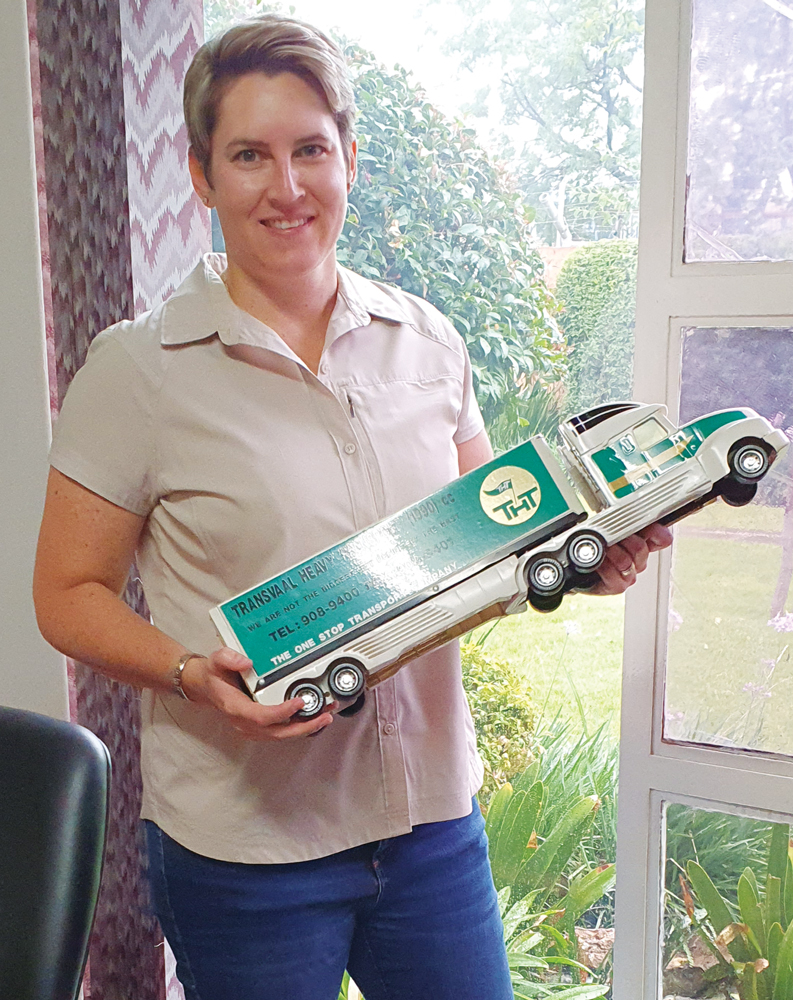Let’s hear it for the ladies! Part 5
Let’s hear it for the ladies! Part 5
The transport and logistics game never used to be populated by members of the fairer sex. However, this has changed. CHARLEEN CLARKE pays tribute to some of the leading ladies in the transport and logistics industry and the trailblazers in supply chain management.
Jeanné Swanepoel-Edwards, executive director of Transvaal Heavy Transport (THT)
In her role as executive director, Swanepoel-Edwards is tasked with running the day-to-day operations of the business. This encompasses anything from estimating to customer relations. “I am very hands-on with every step of the process – the booking of loads, following their progress, site visits, networking with customers and ensuring all processes are executed as efficiently as possible. I am a firm believer in good and honest communication between the organisation, its staff and its customers. To me, every load that is delivered to its final destination is a success story!”
Since joining THT in 2012 as the customer relations officer/marketing representative, Swanepoel-Edwards has played a vital role in many extraordinary projects. “I have been fortunate enough to be a part of many important loads that made a real difference to people’s lives. For example, the 94.2 Jacaranda Water drop, the 737 Boeing for Kidzania at Fourways Mall and delivering feed to farmers in drought-stricken areas. We have also played a part in building and developing the economy, such as delivering substations, locomotives, tanks, underground equipment and various other machines to mines.

“THT has transported goods for various customers to the Kusile and Medupi Power Stations. We were part of one of the first wind farm constructions in Jeffreys Bay, which is still operational. Not only have we assisted here in South Africa, but THT has also been a part of the construction and works at several diamond mines across our borders in Lesotho and Botswana. This included the construction of the Katse Dam in Lesotho, to name but a few,” she reveals.
She’s gratified to see more and more women in the transport and logistics arena. “This is very encouraging. However, it is also disappointing that women still have to work harder, be better at their jobs and constantly prove themselves before being accepted in the industry. The most annoying aspect of all is that salaries, at all levels in the transport trade, are still lower for women than for men, regardless of qualifications, ability and performance.
“As in far too many industries today, worldwide, women have to fight for leadership positions. This is a battle that has faced us for centuries. It’s a war of attrition against people’s mindset, one step at a time! Look how far we’ve come since they gave us the right to vote!” she notes.
She would love to see more women in the transport and logistics game. “Currently at THT, the management team is made up of more women than men, and quite honestly, things run better and more efficiently! In this industry, where women have something to prove, they tend to be more focused, better qualified and far more driven.”
Lerato Thabede, managing director of Deffinity Training Solutions
While Thabede didn’t even know what SCM was all about a mere 13 years ago, today she runs a successful training company called Deffinity Training Solutions, she is a member of the SAPICS SMME Initiative committee, and she is a SAPICS-accredited instructor. Her first taste of SCM saw her working with packaging in a warehouse 13 years ago. “I started working for a company that placed me in their logistics department. My job was just labelling boxes and packaging, but I fell in love with the industry,” she relates.
Since then, Thabede says that the industry has changed considerably. “Things have become much more advanced and technological innovations are making headway. However, we still need to get the transformation side of our industry right. We need to work on inclusion and diversity in the industry and making sure we make strides to improve,” she stresses.
Thabede is pleased to note that there is more acceptance of women in SCM. “I see and meet more women in leadership positions now. There may not be an equitable man to female leadership ratio however I am glad that large corporations are realising that women can lead in our male-dominated industry.”

She founded Deffinity Training Solutions in order to upskill the lower-level employee. “They’re the ones who are most forgotten at times, who often only get on-the-job training. This is where I want to be and then I want to ensure the longevity and growth of my industry.”
Most recently, she was contracted to facilitate the DREAMS Supply Chain Training Programme, where 39 young women from poor backgrounds were facilitated and trained on essential supply chain skills. “This is a programme of which I am very proud to have been a part,” she notes.
Like so many of her colleagues, Thabede believes that we need more women in SCM. “We not only need more women, but we need more women in positions of power and leadership in SCM. Given the opportunity, we can build our supply chains to be even greater.”
She encourages women to consider this career path. “This is more than a career. It is an exciting path of life and so fulfilling. There are so many different types of activities that you do on a day-to-day basis, and you will never get bored. I say go for it!”
Chanti Wilson, executive leadership coach, business consultant and SAPICS director
Engineering graduate Chanti Wilson is a specialist in FMCG supply chain management. As an executive leadership coach and business consultant, she helps global organisations to optimise their operations and supply chains and entrepreneurs to grow their businesses. She is a director of SAPICS and chair of the SAPICS SMME task group, a training and support programme geared towards boosting small, medium and micro enterprises by building their skills in the important area of SCM.
As a graduate engineer, Wilson had a number of options for her first job. “I remember that one company was rather enthralled by my passion for sewing. They needed an engineer who understood patterns and fabrics. However, in the end, I chose to work for a company that had other women in the technical field, namely Unilever,” she relates.
Wilson joined the business as a graduate engineer on the training programme. “However, at some point, the fact that I was an engineer was forgotten and I was isolated in the packaging department with limited exposure to enable me to build my career. It was only when I was exposed to the occupational health and safety department that things got back on track. Luckily I had a phenomenal boss who started to open doors for me.”

She began her working career in the factory. “I worked through various areas such as production, OHS and World Class Manufacturing. Unilever developed a Supply Chain Academy in about 2004 and I got involved in designing learning material. I was also exposed to SAPICS and the APICS Qualifications. I learnt a huge amount about SCM, which I was able to transfer to my next role as a supply chain consultant. I was privileged to work with big organisations like Distell, Illovo, Astrapak and Omnia on optimising their planning practices. Later, I got involved in writing best practice material that was used by our global consulting team across the world in multiple industries.”
Like her peers, Wilson says the industry has changed considerably. “The entire world of work has changed. The ideas of flexible working, onboarding processes and mentors to support new graduates have improved the world of work significantly. It is a vast improvement on the world of work when I first started. Equal pay has also come to the forefront, whereby women are paid for the work they do on par with their male counterparts. As production manager, I was the lowest-paid (and only female) engineer in the factory. I remember when factory clothing was issued, I would take the two other ladies in the factory shopping, as the male-designed factory wear did not fit the female form,” she recalls.
Things are different today – and women are coming to the fore. “I have had the privilege of working with a number of phenomenal women in leadership positions recently. The expectations have changed radically. It is now acceptable to bring your personality to work, to dress with flair and not mimic the male ideas of what workwear is appropriate.”
Recently, she resigned from full-time consulting in order to do something completely different. “I work multiple part-time roles that enable me to keep my mind stimulated and permit me to grow continuously. I offer career and business coaching to individuals and small businesses, I tutor MBA students and work part-time in client support for a global supply chain consultancy. I love the fact that every day is different, my work-life balance is mostly optimised, and I can ride my bicycle during the week or do something fun with my daughter. My current role is the dream. It is flexible, interesting and fun.”
She encourages young women to consider a career in the supply chain profession. “Do not be afraid to ask the difficult questions. Have courage for tough conversations, they are ground-changing. Be yourself and believe in yourself. You can do this!” she says.
It certainly seems as though these leading ladies have mastered that art.
Published by
Charleen Clarke
focusmagsa




